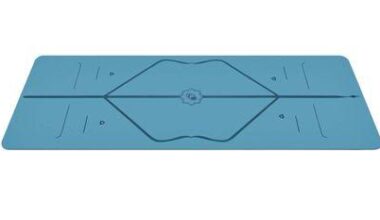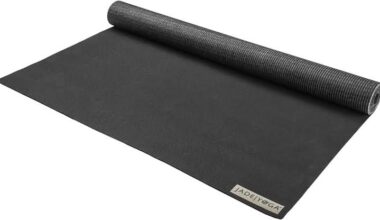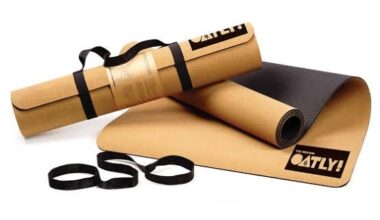Table of Contents Show
Which part of the yoga mat is up? Uncover the answer to one of yoga’s most asked questions in our comprehensive beginner’s guide. Equip yourself with the knowledge to optimize your practice today.
If you’ve just started practicing yoga, you may have found yourself wondering which side of the mat is supposed to face up. After all, there’s no visible indication on most mats. In this article, we’ll explore the answer to this question, along with some related tips for caring for and using your yoga mat.
Disclosure: As an Amazon Associate I earn from qualifying purchases.
Why Does it Matter Which Side is Up?
Before we get into which side of the yoga mat is supposed to face up, let’s talk about why it matters. Most yoga mats are made with different textures on each side. The smoother side is typically the “top” side, while the stickier side is the “bottom” side. When you’re practicing yoga, having the right side facing up can affect your grip and stability.
How to Tell Which Side of Yoga Mat is Up
So, how can you tell which side of the yoga mat is supposed to face up? Here are some tips:
1. Check for Labeling
Some yoga mats come with labeling or branding that indicates which side is up. Look for a tag or logo, or check the packaging or instructions that came with your mat.
2. Check for Texture
As mentioned earlier, most yoga mats have different textures on each side. The smoother side is typically the top side, while the stickier side is the bottom side. If you’re not sure, you can run your hand along each side to feel the difference.
3. Look for Wear and Tear
If you’ve been using your yoga mat for a while, you may be able to tell which side is which based on wear and tear. The side that’s been facing down on the floor will likely be more worn than the top side.
Tips for Caring for Your Yoga Mat
Once you know which side of the yoga mat is supposed to face up, it’s important to take care of your mat properly. Here are some tips:
1. Clean Your Mat Regularly
Sweat, dirt, and bacteria can build up on your yoga mat over time, so it’s important to clean it regularly. You can use a gentle, all-natural cleaner or make your own solution with water and vinegar.
2. Avoid Excessive Sun Exposure
Leaving your yoga mat in direct sunlight for extended periods of time can cause it to fade and break down more quickly. Try to store your mat in a cool, dry place when you’re not using it.
3. Roll Your Mat Properly
When you’re finished with your yoga practice, be sure to roll your mat up properly. This can help prevent creases and keep your mat in good condition for longer.
Other Considerations When Using Your Yoga Mat
Here are a few other tips to keep in mind when using your yoga mat:
Use a Towel for Extra Grip
If you’re having trouble with slipping on your yoga mat, consider using a yoga towel or laying a regular towel over your mat for extra grip.
Practice on a Stable Surface
Make sure you’re practicing yoga on a stable surface, such as a hardwood floor or a yoga mat placed on top of carpeting. This can help prevent injury and improve your overall balance.
Don’t Wear Socks or Shoes
To get the most benefit from your yoga practice, it’s best to practice barefoot. Wearing socks or shoes can interfere with your grip and balance.
You May Also Like:
- Which Side of Yoga Mat Should I Use? The 5 Essential Factors to Decoding the Enigma
- Best Yoga Mat for Intermediate Yogis: Elevate Your Practice
Conclusion
In conclusion, understanding which side of the yoga mat is supposed to face up is an important part of practicing yoga safely and effectively. With the tips provided in this article, you should be able to determine which side is up on your mat and care for it properly. Remember to clean your mat regularly, avoid excessive sun exposure, and roll it up properly to keep it in good condition.
Frequently Asked Questions
1. Why does it matter which side of the yoga mat is up?
It matters because yoga mats are designed with a specific texture and grip pattern on one side to enhance your practice and prevent slipping.
2. How can I determine which side of the yoga mat is up?
Look for a slightly stickier or more textured side, often referred to as the “top” side. This side usually provides better traction, allowing you to maintain stability during yoga poses.
3. What should I do if my yoga mat doesn’t have a clear distinction between the sides?
In most cases, there is still a subtle difference in texture or grip between the two sides. Experiment by pressing your hand or foot against each side to determine which feels slightly stickier or provides a better grip.
4. Can I use either side of the yoga mat interchangeably?
While it’s possible to use both sides of the mat, the intended design is to have the stickier side facing up for better traction. However, if you find the stickier side too slippery for certain poses, you can flip the mat to the other side for a less sticky surface.
5. Are there any exceptions where the stickier side faces down?
Some mats, particularly those with alignment markers or patterns, may have the stickier side facing down to prevent the alignment markers from rubbing against the skin. However, this is less common, and most mats have the stickier side facing up.
6. Does it matter which side of the yoga mat is up for hot yoga or sweaty workouts?
Yes, it’s especially important to have the stickier side facing up during hot yoga or sweaty workouts. The increased moisture can make the mat more slippery, and the stickier side helps maintain stability and prevent accidents.
7. Can I use a yoga towel if my mat doesn’t provide enough grip?
Absolutely! If you find your mat too slippery even with the stickier side facing up, placing a yoga towel on top can provide additional grip and prevent slipping.





